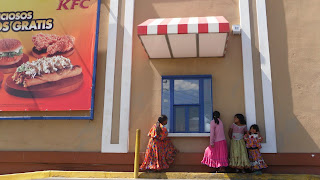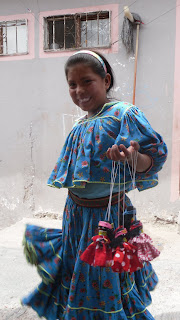On Saturdays, Julissa and several other little girls walk up to the Kentucky Fried Chicken just three blocks from Oasis and stand at the drive-thru window selling dolls. I don't always visit Oasis on Saturdays, but when I do, I make sure to stop by the KFC to say hello. At first, the girls were shy about waving at me--they were embarrassed that I saw them working, I think. It felt strange not to have them greet me with huge smiles and run up to me to hug me. It was one of those moments in which I realized that the rarámuri really do live in their own world, despite the fact that they share public spaces with chabochis.
But a couple days ago, Julissa felt like revealing more details about her weekends. I already knew that Saturdays are dedicated to selling at the KFC, and Sundays she and her mother walk to the dam to sell to the fishing crowds. What I learned a couple days ago is that Julissa and the other girls typically arrive to the KFC at 10 AM and stay until 4 PM, or sometimes even until 8 PM, if business has been slow. I ask her if they get to eat, and she said their moms pack them lunches, and sometimes mestizos will buy them chicken or mashed potatoes from KFC. Julissa sells an average of 10 dolls a day. At 10 pesos each (a little less than $1 U.S. dollar), Julissa earns 100 pesos (or less than $10 U.S. dollars) standing in the heat or cold selling dolls for six to ten hours each Saturday.
It's hot in Chihuahua now. All week we were between 95 and 100 degrees, and summer hasn't even started yet. Yesterday I drank 1.5 L of water in two hours and still had a headache from walking in the sun with Cuka and Julissa for half an hour. Julissa is very young and doesn't seem to be terribly affected by the extreme heat, but anyone who has to stand outside for six hours is at risk for dehydration and heat stroke. And all day, every day, there are rarámuri women standing at the most trafficked intersections trying to make a living. The typical Chihuahuense inside an air-conditioned car comments that the rarámuri are too lazy to work and prefer standing on a street corner asking for handouts. One day, a mestizo should try selling dolls for six hours during the summer and then decide if it is laziness that keeps the rarámuri selling little crafts or candy, or even seeking kórima, on the streets.
Julissa was very funny yesterday imitating mestizos who buy dolls from her. She did an imitation of a dialogue for me, complete with voices and facial expressions. This is how a typical dialogue between her and a potential buyer pulling up to the KFC window goes:
Julissa: "compre monito" ("buy a doll")
Mestizo: "A cuánto los vendes?" ("how much do you sell them for?")
Julissa: "diez pesos" ("ten pesos")
Mestizo takes a look at the dolls Julissa holds up to display. "No tienes de vestido morado?" ("do you have one with a purple dress?")
Julissa: "no."
Mestizo: "o de azul? o amarillo? o rojo?" (or blue? or yellow? or red?) Here, Julissa began talking very fast, imitating the mestizos demanding dolls with different colored dresses.
Finally, mestizo stops asking for colors that Julissa doesn't have in her display. Mestizo then starts inspecting the dolls' faces, which are made with brown cloth and have white eyes and red lips stitched with yarn.
Mestizo: "Este tiene muy fea boca...y este también...este sí me gusta" ("This one has an ugly mouth...this one too...I like this one.")
Finally, Julissa makes a sale. I asked her if mestizos ever say anything nice to her, ever compliment her dress or something. "No," she answered shortly, then changed the subject.
 The girls at their sale post outside the KFC. They were too embarrassed to turn and look into the camera.
The girls at their sale post outside the KFC. They were too embarrassed to turn and look into the camera. Julissa is the one in the orange dress hiding her face. The one in the pink skirt is Elena, and the one in the green is Erika. All three are in third grade together.
Julissa is the one in the orange dress hiding her face. The one in the pink skirt is Elena, and the one in the green is Erika. All three are in third grade together. Eligia, Erika's mother, sat on the sidewalk with two of her younger daughters making more "monitos" and keeping an eye on the older girls as they sold. In rarámuri culture, children are expected to help their parents with their work, a practice which in the Sierra means helping tend to the harvest. In the city, this practice often means selling "monitos" which their mothers make.
Eligia, Erika's mother, sat on the sidewalk with two of her younger daughters making more "monitos" and keeping an eye on the older girls as they sold. In rarámuri culture, children are expected to help their parents with their work, a practice which in the Sierra means helping tend to the harvest. In the city, this practice often means selling "monitos" which their mothers make. One of Erika's little sisters peeking through a KFC window at chabochi customers eating.
One of Erika's little sisters peeking through a KFC window at chabochi customers eating. On a different day, Julissa showing me how she displays the "monitos," as they call the little dolls, to customers at the KFC drive-thru on Saturdays.
On a different day, Julissa showing me how she displays the "monitos," as they call the little dolls, to customers at the KFC drive-thru on Saturdays.
No comments:
Post a Comment